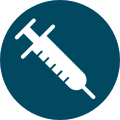Hepatitis C (hep C or HCV) is a serious and curable liver disease caused by a virus.
Hep C often has no symptoms or very mild symptoms. Many people who have hep C do not know they are infected. Without treatment, hep C can cause serious, long-term health problems, including liver failure.

Disease Information
Communicable diseases are diseases that spread between people or animals. Click on the buttons below to learn about specific diseases. For more disease information, visit the CDC's health topics index.

Our vision:
A safe and healthy Kitsap County for all.
Communicable Disease Data Dashboards
This report displays respiratory virus trends for Kitsap County based on data from healthcare facilities and laboratory testing. The Respiratory Illness Report is published weekly during respiratory illness season (typically fall and winter months) and published monthly when respiratory illness activity is low. You can subscribe to receive this report by email or text.
What to know about hep C
Hep C most commonly spreads when someone has contact with blood from a person who has hep C.
Examples of ways hep C can spread include:
Sharing needles, syringes, and other drug paraphernalia
Getting a tattoo or body piercings from someone who isn't licensed
A pregnant parent who has hep C can pass the virus to their baby.
There is no vaccine to prevent hep C.
Most people with hep C have no symptoms or only mild symptoms. Symptoms can include tiredness, abdominal pain, jaundice (yellowing of the skin and eyes), nausea, and vomiting.
Get tested for hep C
Getting tested is the only way to know if you have hep C. Every adult should get tested at least once.
Are 18 or older and have not been tested
Are pregnant
Inject drugs or have ever injected drugs, even once
Have HIV or a weakened immune system
Had a blood transfusion or organ transplant before 1992
Were born to a parent with hep C
If you need testing, contact your healthcare provider or a clinic. If you need help getting testing or treatment, call us at 360-728-2235.

Using a mobile device? These data dashboards cannot be viewed on a phone or tablet. Please visit this webpage from a computer.
Rabies Data
Hepatitis C
Healthcare Provider Resources
Looking for more healthcare guidance or resources? Visit our Provider Resources page.






.png)
